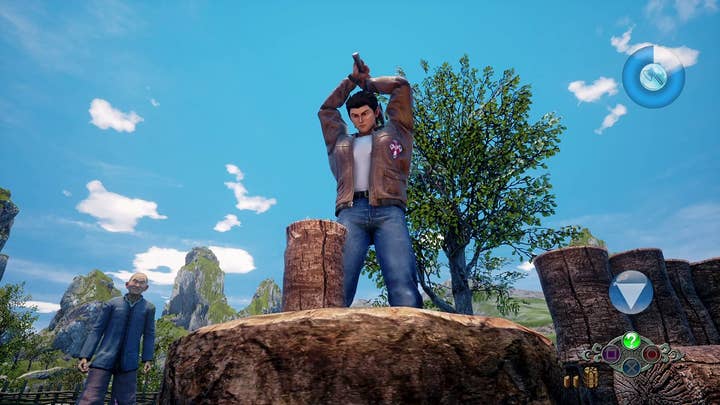People of the Year 2019: Yu Suzuki
Shenmue III came out 18 years after its predecessor and picked up exactly where it left off
Yu Suzuki is one of our People of the Year solely for the fact that Shenmue III exists. It's difficult to overstate how unlikely this seemed.
Originally released in 1999, Shenmue was Suzuki's big system-seller for the Sega Dreamcast. It was a trailblazer for the time, a 3D open world in a grounded, modern setting with a day-night cycle and variable weather effects at a time when the PSone and Nintendo 64 had set the expectations for 3D console titles.
Shenmue blended RPG, fighting, and adventure game elements to tell the protagonist Ryo's story of revenge, one that tended to be frequently interrupted by optional pursuits like playing arcade games or collecting capsule toys. (In some sense these were less distractions than time fillers, because if the next major plot point involved meeting a person at a certain place Wednesday at 2 p.m., players could have in-game hours or days to kill before getting there, and no way to skip ahead beyond the usual nightly sleep.)
Shenmue was revolutionary, influential, and beloved--but not commercially successful
Shenmue was revolutionary, influential, and beloved by its fans. It was billed as the most expensive game ever made, with Suzuki once saying it cost Sega $47 million in development and marketing. Long before developers trotted out the "We always conceived this new IP as a trilogy" chestnut, Suzuki was talking about Shenmue as a story that would need at least five games before the original was even out.
But just like the platform it was supposed to sell, Shenmue did not enjoy commercial success to match its critical plaudits. Even so, it did well enough for Sega to move forward with a sequel. But while Shenmue II was still in development, Sega dropped a bombshell and announced its withdrawal from the hardware market entirely to become just another third-party publisher. By the time Shenmue II released in late 2001, the Dreamcast was dead and buried to the point that Sega didn't even bother releasing it in North America, waiting a full year to port it to the Xbox instead.
While there was still plenty of Ryo's story left to tell, it wasn't going to be in Shenmue III. Instead, Sega teamed up with external studio JC Entertainment to co-develop Shenmue Online, an MMO version of the franchise with Suzuki supervising. That project fell apart, and Suzuki focused on developing arcade games for Sega until he formally left the company in 2009. The end of his actual relevant tenure at Sega would appear to have been significantly earlier, as Suzuki's current studio Ys Net was established in 2008, and Sega of America president Simon Jeffery was under the impression Suzuki was no longer an employee a year earlier (He corrected himself as soon as that was reported).
When Suzuki officially left Sega, it had been eight years since Shenmue II's debut. Shemue III had seemed unlikely before. With the writer/director/producer of the franchise and the company that owned it parting ways, Shenmue III looked all but impossible.

But Suzuki wouldn't give up the cause. When asked about Shenmue III in 2011, Suzuki joked that "about 200 people would buy it," but said he still wanted to make it, and said he was confident Sega would let him use the franchise again; the only problem was funding it. A year later, Double Fine Productions would launch a Kickstarter for an old school PC adventure game and suddenly people were hoping every veteran developer with a cherished hit would crowdfund a sequel.
Even so, when the Shenmue III Kickstarter was announced at Sony's E3 2015 press briefing, it was beyond shocking, arguably the biggest surprise E3 has ever seen. When it broke Kickstarter's record for the most-funded video game project ever with more than $6.3 million, it was somewhat less surprising.
Now Shenmue III is out, and by all accounts, it is incredibly faithful to its predecessors. But what was revolutionary when the first Shenmue came out in 1999 is almost reactionary in 2019. Many of Shenmue's ideas -- in particular the simulation of everyday activities and the relaxed pace to its unfolding plot -- elicit words like "mundanity" and "drudgery" from reviewers, even those who clearly appreciate what the game is going for.
As Dia Lancia put it in Paste's 9.9 out of 10 review, "Shenmue III is less about revenge, and more about all the things that get in the way of achieving that goal. It's simple enough to swap 'get the man who killed my father' with any life achievement. Our lives are filled with goals and impediments, diversions and distractions, the things we have to do and the things we want to do that keep us going.
"The Grind. Food. Shelter. Entertainment. Sleep. All the choices we have to make to fulfill those needs and desires are represented here. All crucial, but all subordinate to the flow of time."
To us, that sounds like a perfect takeaway for Shenmue III. Yu Suzuki is one of our People of the Year for achieving this goal despite 18 years of impediments, diversions, and distractions.









